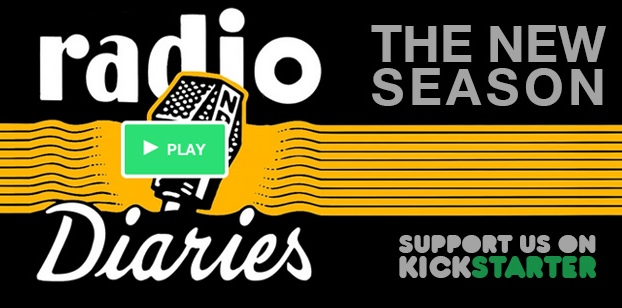Here Is Why You Should Help Radio Diaries’ Kickstarter Campaign This Week
Click here to make a donation.
You’re weeding your garden with your ear buds in, or whisking your kid off to soccer with the car radio on, and, all of a sudden, almost-lost voices are offering you their stories. Seventy-nine year old Elizabeth Eyre Taylor cranks up a Piper Archer II aircraft and talks to you about life as a “WASP,” one of roughly a thousand female military pilots in the United States’ World War II Air Force. Ron Taylor discovers that a vanished former associate, the arch-segregationist speech-writer Asa Carter, has reemerged in the guise of folksy, would-be Cherokee storyteller Forrest Carter. Nelson Mandela recalls his surprise at the triumphant crowds that greeted him upon his release from twenty-seven years in jail.
Thank Radio Diaries. Since 1996, the prize-winning non-profit has pioneered new ways of telling true tales, past and present, bringing its vital documentaries of everyday life to public radio listeners on All Things Considered, This American Life, the BBC, and through its own podcast. You know a Radio Diaries broadcast when you hear one. It quietly celebrates the power of ordinary people to make sense of their lives and convey those lives to others. It puts listeners’ hands on the odd, intimate, forgotten corners of events we’ve polished into familiarity. It delivers social worlds through hard-won layers of sound: present-day interviews intercut with newsreels, radio broadcasts, television programs and crackling phonographs.
Radio Diaries is well-known for its contemporary documentaries, like Teenage Diaries, which hands microphones to young people around the country—a gay teen struggles to explain to her Catholic family that her sexuality is not just a “phase,” a young Mexican man who, as a child, crossed the Rio Grande without documents describes his life as an “illegal”—and Prison Diaries, in which inmates, correctional officers and a judge share their versions of life behind bars.
But Radio Diaries also does what we do: recover, rebuild and represent past moments and worlds. Its programs have transported listeners back to the Bonus Marchers’ tent city, to New York’s populist “Miss Subway” pageants of the 1940s that celebrated the city’s female commuters (and integrated more than thirty years before the Miss America pageant did), and the single day in 1936—November 22nd—when bluesman Robert Johnson and cellist Pablo Casals each laid down revolutionary musical tracks.
Radio Diaries interviews scholars and consults with a team of historians (full disclosure: I’m one of them) who serve as story scouts and guides to archival sources and secondary literature. But its producers are especially drawn to stories involving everymen and every-women as historians, puzzling out mysteries from their families’ or communities’ pasts. One woman embarks on a quest to discover the truth about her grandfather, Willie McGee, an African-American man in mid-20th century Mississippi who was charged with raping a white woman, tried by an all-white jury and, despite years of protest, executed in the state’s traveling electric chair. One man goes in search of his uncle, Brother Claude, the Gospel Ranger, an fiery Appalachian speaker and singer whose music shaped early rock n’ roll.
A self-admitted “archival tape geek,” Radio Diaries founder Joe Richman loves tracking down not just familiar clips of tape but the “moment just before the famous speech, the things that happen on the margins, before the action we all know happens.” The work is labor-intensive and time-consuming: locating usable recordings in private collections, public archives, and media holdings, chasing down interview subjects with stories to tell in front of a microphone, and weaving together their narratives with period music, news recordings, and other soundscapes.
For Radio Diaries’ five-part program on the life of Mandela, Richman spent a year in South Africa recording interviews and gathering tape, receiving what he calls a “master class in the history from the people who experienced it.” He discovered to his surprise that, while film and photo archives had been widely used, “there was all of this audio material that people had paid no attention to”: a boosterish state broadcast champions apartheid as a tool of modern efficiency; lively, satirical songs by black South Africans ridicule the system and its architects. The goal, says Richman, is to connect listeners to experiences different from their own, whether past or present, and to make it “visceral enough that people feel like they’re experiencing it.”
Why support Radio Diaries? Because, as we historians arguably know better than anyone else, textured, well-crafted, richly sourced history costs money, money that Radio Diaries uses resourcefully. Because its programs make the case for what we do—crafting a past that is both its own strange universe, and kin to our own—with intimacy and immediacy. Because the shows are compelling teaching resources (you can tell your students they won’t even have to turn off their phones to listen to them.) And for the sheer delight of hearing Violet Cowden, a former WASP pilot, share a mid-air reverie she’d had, likening a flight through cumulus clouds to a stroll down New York City streets.
As Mandela tells Radio Diaries, “it is always important to look at your history.” And listen to it, too.
